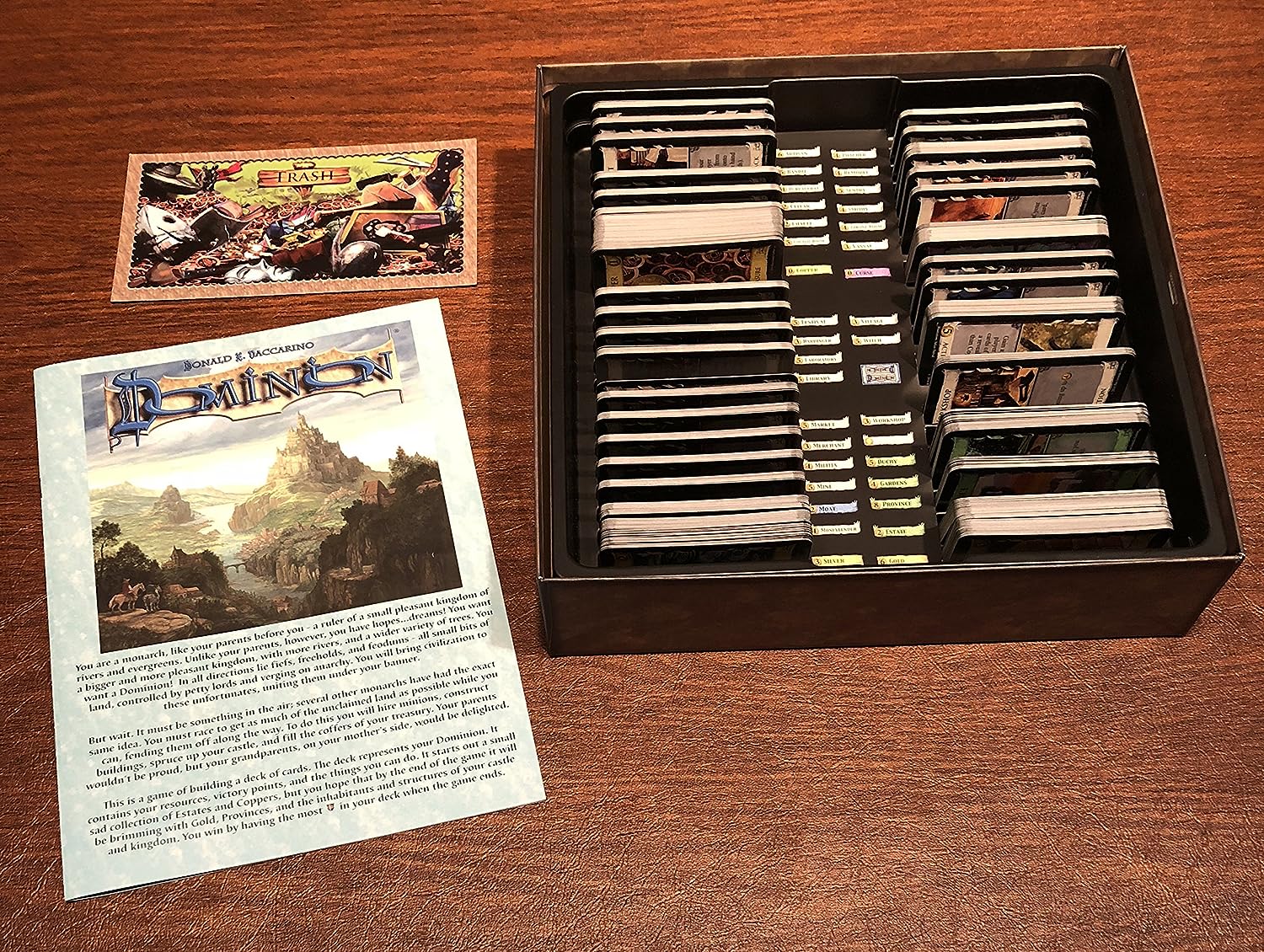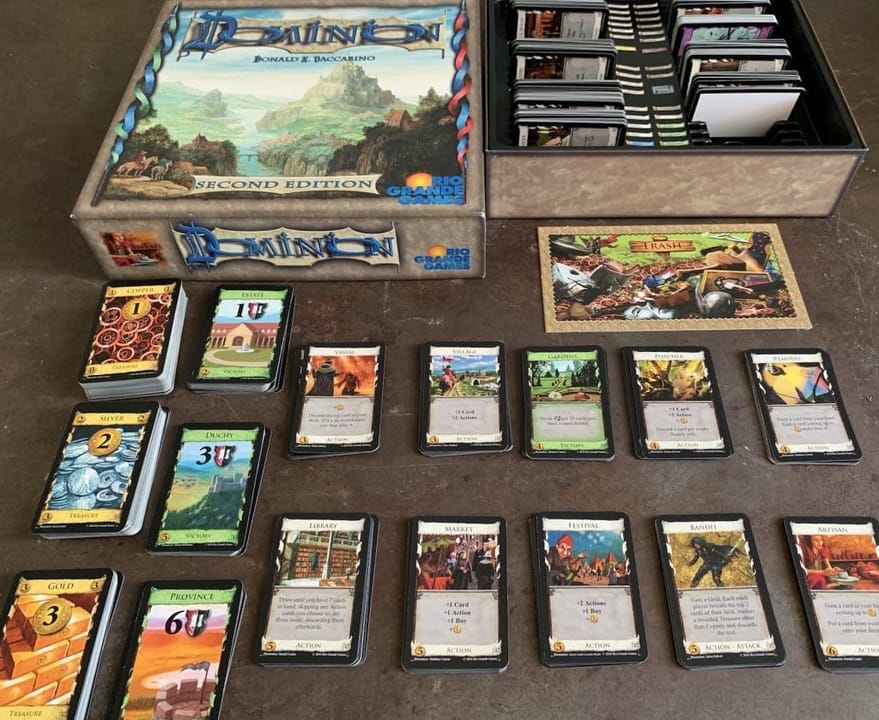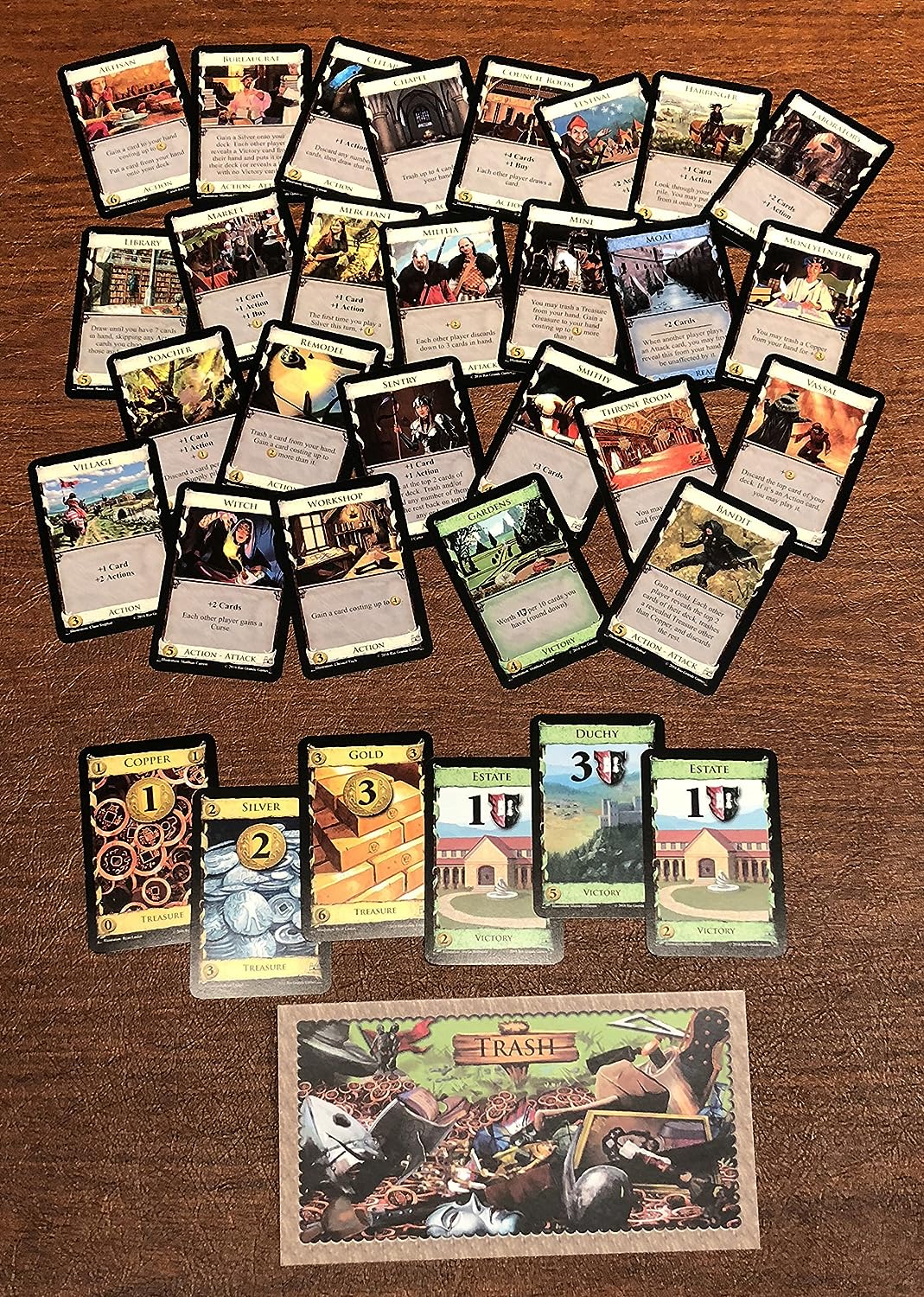Picture a land where the currency isn’t gold coins or shiny gems but, wait for it, copper, silver, and gold cards. Welcome to the whimsical world of Dominion, where you play the role of a feudal lord with an obsession for collecting cards. Your goal? To build the most ridiculously impressive kingdom.
So, there you are, surrounded by your trusty Council Rooms and Moats, while plotting the purchase of Smithies, Villages, and Markets. You even have a Throne Room because, well, you’re a lord, and every lord needs one. But watch out for those pesky Witch cards that curse your deck.
As you acquire cards and craft combos that make your friends either laugh or cry, you realize that Dominion is like a medieval deck-building party where you, the lord, are the host, and victory points are the currency that will crown you the King of the Cardboard Castle.
What’s included in Dominion (base game)

- Kingdom cards: These cards are used for various actions during the game.
- Treasure cards: These provide coins used to buy other cards.
- Victory cards: These cards represent VP and are counted at the end of the game.
- Curse cards: These are negative VP cards.
How to play Dominion

Setup
- Remove the 8 VP cards (Provinces) from the Victory card pile for a 2-player game, 12 for a 3-4 player game, or 12 for a 5-6 player game.
- Shuffle the Kingdom card deck and deal 10 face-up cards to form the Supply.
- Each player starts with 7 Copper and 3 Estate cards (basic cards).
- Shuffle your starting cards to form your initial deck.
- Draw 5 cards from your deck to form your initial hand.
Rules for Dominion
The game is played in turns and follows these phases:
- Action Phase
- Play one Action card from your hand (if you have any).
- Follow the instructions on the Action card. Actions may include drawing extra cards, gaining extra actions, or acquiring cards from the Supply.
- Buy Phase
- Play any number of Treasure cards from your hand.
- Calculate the total coins you have for this turn.
- Buy one card from the Supply. Place it in your discard pile.
- If you can afford multiple cards, you may buy more, but you can’t split your coins between cards.
- Clean-up Phase
- Discard all the cards from your hand and the cards you played this turn.
- Draw a new hand of 5 cards from your deck. If your deck is empty, shuffle your discard pile to form a new deck.
End of the Game: The game ends when
- The Province card pile is empty, or
- Any 3 Supply card piles are empty.
Now, calculate your score. Add the VP from your Victory cards and subtract any Curse cards. The player with the most VP wins!
For the official rules, see the link below:
All cards from the base game

In the base game of “Dominion,” there are several types of cards that players can acquire to build their decks and score victory points. Here is a list of all the card types and their descriptions:
Kingdom Cards
- Cellar: +1 Action, Discard any number of cards, +1 Card per card discarded.
- Chapel: Trash up to 4 cards from your hand.
- Moat: +2 Cards, When another player plays an Attack card, you may reveal this from your hand to be unaffected.
- Harbinger: +1 Card, +1 Action, Look through your discard pile, put one card from it into your hand.
- Merchant: +1 Card, +1 Action, The first time you play a Silver this turn, +$1.
- Vassal: +2 Coins, Discard the top card of your deck. If it’s an Action card, you may play it.
- Village: +1 Card, +2 Actions.
- Workshop: Gain a card costing up to $4.
- Bureaucrat: Gain a Silver card; put it on top of your deck. Each other player reveals a Victory card from their hand and puts it on top of their deck (or reveals a hand with no Victory cards).
- Gardens: Worth 1 VP for every 10 cards in your deck (rounded down).
- Militia: +$2, Each other player discards down to 3 cards in hand.
- Moneylender: +$3, Trash a Copper from your hand.
- Poacher: +1 Card, +1 Action, +1 Coin. Discard a card per empty supply pile.
- Remodel: Trash a card from your hand. Gain a card costing up to $2 more than the trashed card.
- Smithy: +3 Cards.
- Throne Room: You may play an Action card from your hand twice.
- Bandit: +$2, Gain a Gold. Each other player reveals the top 2 cards of their deck, trashes a revealed Treasure other than Copper, and discards the rest.
- Council Room: +4 Cards, +1 Buy. Each other player draws a card.
- Festival: +2 Actions, +$2, +1 Buy.
- Laboratory: +2 Cards, +1 Action.
- Library: Draw until you have 7 cards in hand. You may set aside any Action cards drawn this way, as you draw them; discard the set-aside cards after drawing.
- Market: +1 Card, +1 Action, +1 Buy, +$1.
- Mine: You may trash a Treasure from your hand. Gain a Treasure to your hand costing up to $3 more than the trashed card.
- Sentry: +1 Card, +1 Action, Look at the top 2 cards of your deck. Trash and/or discard any number of them. Put the rest back on top in any order.
- Witch: +2 Cards, Each other player gains a Curse.
- Adventurer: Reveal cards from your deck until you reveal 2 Treasure cards. Put those Treasure cards into your hand and discard the other revealed cards.
Victory Cards
- Estate: Worth 1 VP.
- Duchy: Worth 3 VP.
- Province: Worth 6 VP.
Treasure Cards
- Copper: Worth $1.
- Silver: Worth $2.
- Gold: Worth $3.
Curse Card
- Curse: Worth -1 VP.
These are the cards included in the base game of “Dominion.” Players can use these cards to create unique decks and develop strategies to gain the most victory points and win the game. Additional expansions introduce more cards and mechanics, expanding the gameplay possibilities.
How to win Dominion
Winning “Dominion” involves a combination of effective deck-building, strategic card play, and adapting to your opponents. Here are some tips and strategies to increase your chances of winning:
- Understand Card Synergies: Pay attention to the Kingdom cards available for purchase each game. Look for card combinations that work well together. Some cards have powerful synergies when played in tandem, such as Throne Room and Workshop or Village and Smithy. Plan your strategy around these synergies.
- Balanced Decks: Aim for a balanced deck that can handle various situations. Include a mix of money-generating cards (Treasures), action cards for drawing more cards or taking additional actions, and victory cards for scoring points. Avoid overloading your deck with too many Victory cards early in the game, as this can lead to weak hands.
- Economy Management: Managing your economy is crucial. Invest in Treasure cards like Silver and Gold to increase your buying power. But don’t neglect Action cards that provide card draw or additional actions, as they help you cycle through your deck more efficiently.
- Trash Weak Cards: Trash your starting Copper cards when possible, especially early in the game. Cards like Chapel and Moneylender allow you to thin your deck by removing weak cards, improving the quality of your draws.
- Adapt to Opponents: Pay attention to your opponents’ strategies and adjust your game plan accordingly. If they’re pursuing a heavy Victory card strategy, consider contesting the Provinces. If they’re buying a lot of Attack cards, invest in defenses like Moats.
- Focus on VP: Remember that the primary goal is to accumulate Victory Points. In the later stages of the game, prioritize purchasing Provinces and Duchies to boost your VP total. However, ensure that you maintain a reliable source of buying power to do this.
- Attack Cards: Be mindful when using Attack cards. They can slow down your opponents, but over-reliance on them can slow down your own deck’s progression. Use Attacks strategically, and consider how they fit into your overall strategy.
- Cycling: Efficient deck cycling is key to drawing the best cards in each hand. Action cards that allow you to draw more cards (e.g., Smithy, Laboratory) and cards that grant extra actions (e.g., Village, Festival) help with cycling.
- Timing is Everything: Plan your turns carefully. Consider when to play Actions, when to buy cards, and when to pass. Try to maximize your actions and buying power each turn.
- Evaluate Game Progress: Keep an eye on the game’s progress. As the supply piles of Kingdom cards run low, shift your focus to acquiring Provinces and ending the game if you have a lead in VP.
- Count Cards: As you play the game more, you’ll become better at tracking which cards have been played and what’s left in your deck. This can help you make informed decisions about your next actions.
- Experiment and Learn: “Dominion” offers numerous card combinations and strategies. Don’t be afraid to experiment with different approaches and learn from your games. Adapt your tactics based on the specific cards in play.
Remember that “Dominion” is a game that rewards adaptability and skillful deck-building. Developing a deep understanding of card interactions and recognizing the optimal time to shift your strategy is key to achieving victory.